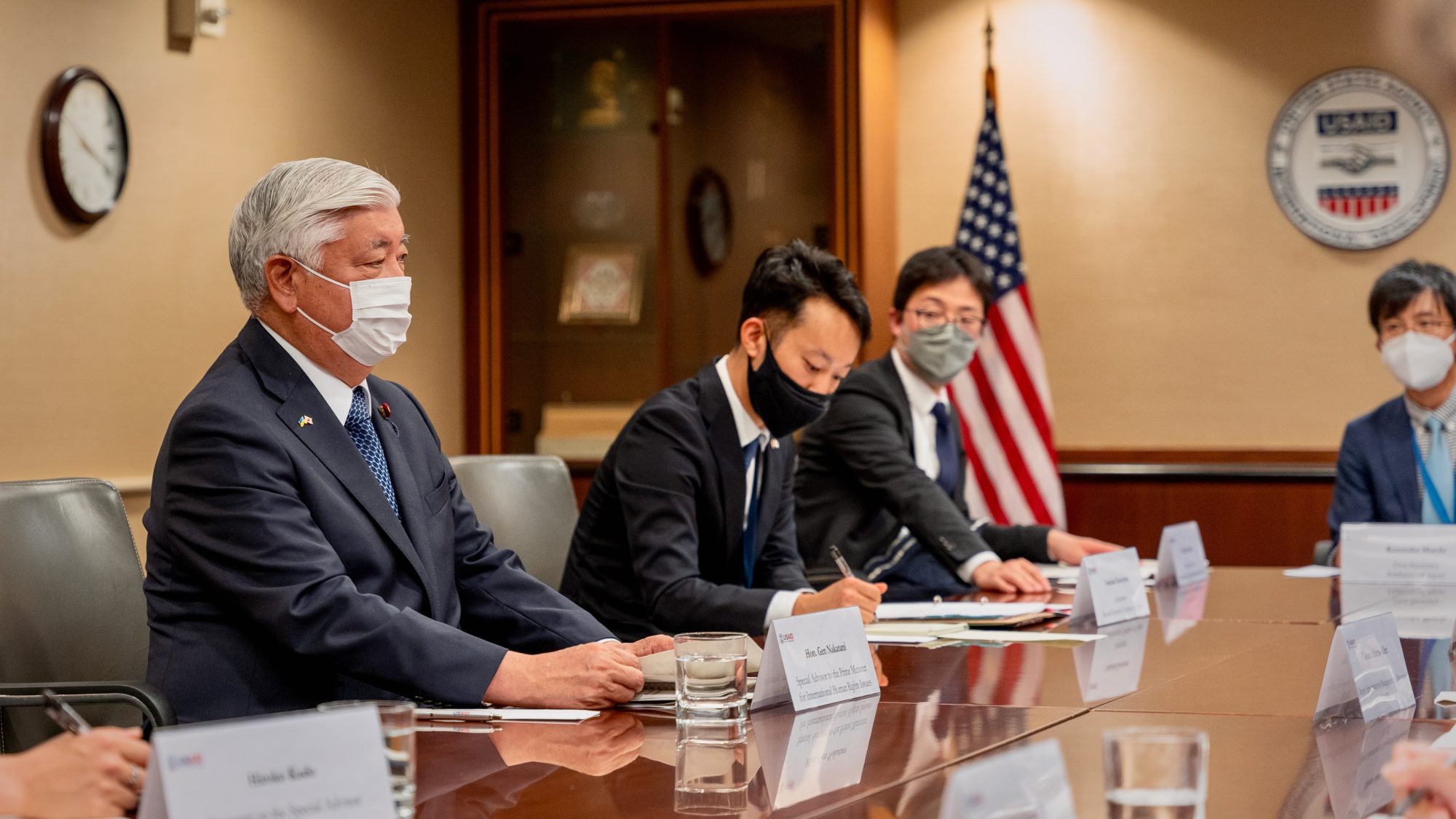
Title: High-tech Policy and its Potential to Roil US Alliances in Northeast Asia
The US-Japan-ROK trilateral relationship is a pillar of Northeast Asian security. The three countries are central: individually, in their bilateral relationships and together, to maintaining peace in a potentially unstable part of the world. Historically, their cooperation focused on the provision of “hard security” – capabilities and forces that would deter an aggressor or defeat it if it decided to attack one of the three countries.
Economic security plays an ever-expanding role in every country’s national security. Of particular importance is the concept of resilience – ensuring that a country is not vulnerable to supply shortages of key materials or resources and thus susceptible to external coercion – and control of access to especially important technologies, such as high-end semiconductors. Both have assumed an increasingly prominent place in alliance discussions. The Biden administration’s Indo-Pacific Strategy seeks closer collaboration with allies on emerging technologies and strengthening regional security partnerships to counter China. Washington has launched economic security dialogues with each ally: the US and the ROK held their first session on July 7, 2022, while the US and Japan inaugurated their Economic Policy Consultative Committee (“Economic 2+2”) on July 29. Economic security in its various guises–technology development, creation of resilient supply chains, and strategic trade controls, to name but three–also figures prominently in an expanding array of mini- and multilateral security efforts, dotting the Indo-Pacific, the Australia-UKIn an era of renewed great power competition between the United States and China and the emergence of a new national security economy, efforts to promote economic security assume greater significance. The three countries are world leaders in technologies that are central to economic growth and dynamism and will lay the foundation for economic leadership and power. Their cooperation on these issues is thus critical; however, it will also be a challenge because of divergent views of China and the readiness to give up business opportunities over strategic concerns.
Economic security plays an ever-expanding role in every country’s national security. Of particular importance is the concept of resilience – ensuring that a country is not vulnerable to supply shortages of key materials or resources and thus susceptible to external coercion – and control of access to especially important technologies, such as high-end semiconductors. Both have assumed an increasingly prominent place in alliance discussions. The Biden administration’s Indo-Pacific Strategy seeks closer collaboration with allies on emerging technologies and strengthening regional security partnerships to counter China. Washington has launched economic security dialogues with each ally: the US and the ROK held their first session on July 7, 2022, while the US and Japan inaugurated their Economic Policy Consultative Committee (“Economic 2+2”) on July 29. Economic security in its various guises–technology development, creation of resilient supply chains, and strategic trade controls, to name but three–also figures prominently in an expanding array of mini- and multilateral security efforts, dotting the Indo-Pacific, the Australia-UK-US (AUKUS) enhanced trilateral security partnership and the Quadrilateral Security Dialogue (the Quad) among them. These initiatives are especially valuable as tech controls are invariably stronger when implemented by groups of countries as multiple suppliers often exist.
The case for trilateral cooperation is simple. The three countries share values, interests, and preferences in the regional and global order; as world leaders in tech development and production they have complementary capabilities; as postindustrial societies they share vulnerabilities, such as susceptibility to penetration or disruption; and finally, failure to work together not only misses opportunities for synergies and efficiencies but could create gaps in security.
Early in 2022, the top diplomats from the three countries met and “emphasized the importance of trilateral cooperation … to strengthen the rules-based economic order and ensure prosperity in the Indo-Pacific region and the world.” They highlighted “economic security, including by promoting innovation of critical and emerging technologies based on democratic values and respect for universal human rights.”
The leaders’ statement issued after the recent trilateral summit in Cambodia devoted considerable attention to economic security, President Joe Biden, Japanese Prime Minister Kishida Fumio and South Korean President Yoon Suk-yeol emphasized “the importance of trilateral cooperation to strengthen the rules-based economic order to enhance economic security and prosperity throughout the Indo-Pacific and the world.” (That language is virtually identical to that in the previous statement; when something becomes diplomatic boilerplate it’s a good indication that it’s supposed to be routine.) That includes such measures as a trilateral dialogue on economic security, promoting and protecting technology leadership, ensuring secure and resilient supply chains, protecting infrastructure and enhancing cooperation on critical and emerging technologies—such as artificial intelligence, biotechnology, quantum information science and technology, and advanced communications.
As compelling the case for cooperation may be, pulling it off will be a challenge. Leave aside the troubles that plague the Japan-South Korea bilateral relationship; they have been amply covered elsewhere and doing more than acknowledging them here would consume the rest of this analysis. The chief problem is historical disputes that have been given additional weight and substance by domestic politics, which continue to undermine and paralyze their relationship.
More vexing, is the ambivalence in both Tokyo and Seoul about following the US lead in shutting down the transfer of emerging technologies to China. While the United States and its allies have long implemented restrictions on the trade of sensitive technologies, those controls historically addressed military applications: the chief concern has been the way leakage could improve an adversary’s ability to fight. The current strategic competition, which focuses on the leadership enabled by mastery of the frontiers of emerging tech, requires a far more expansive definition and consideration of technology to be controlled.
In addition, these technologies can be used in new and frightening ways to enable authoritarian regimes to control and suppress their public. As Japan’s former science and technology minister explained, “emerging technologies such as the internet of things, 5G, artificial intelligence, and quantum technology not only produce economic benefits but have the potential to affect civil liberties, human rights and even national security.”
The United States has accepted this new reality and is responding. The semiconductor regulations adopted in October 2022 aim to impede China’s development in supercomputing, which has applications for the military and more generally. This is the first step; similar actions will follow that restrict access to similar technology in other sectors such as biotechnology, artificial intelligence and quantum computing. This is part of a broad strategy – “technology containment” — to slow China’s development and ensure that it cannot compete with the United States.
However, allies have been slow to join. The US decision in October was unilateral precisely because key allies Japan and the Netherlands, manufacturers of chip-making equipment, were reluctant to do so as well. Differences stem from diverging views of the appropriate response to the China challenge. Allies argue that Washington is being too aggressive and its restrictions too sweeping. South Korean Trade Minister Ahn Duk-geun could have been speaking for all US allies when he noted that “Our semiconductor industry has a lot of concerns about what the US government is doing these days.”
There is also fear of losing access to China’s domestic market—costing companies billions of dollars in revenue —funds that are essential to their longer-term competitiveness. That hesitance to join US sanctions ratchets up tensions within alliances, as US companies complain that competitors are benefitting from actions taken by the US government: for instance, the October decision which restricts only US business’ activities in the name of collective defense.
China is encouraging allied governments to stand tall against US pressure, urging them to maintain their independence and keep their eyes fixed on the massive Chinese domestic market. This summer, Chinese Foreign Minister Wang Yi told South Korean counterpart Park Jin that the two countries should maintain their independence and freedom from external interference. The Global Times, a nationalist tabloid in China, warned that “If Japan succumbs to US pressure on export restrictions and gives up the Chinese market, international investors may lose interest in Japan and stop their planned investment or even pull their capital out of the country.” While both Tokyo and Seoul insist that they will work closely with the United States on technology concerns, the record shows a gap between words and actions.
The United States insists that its allies will get in line. Consultations have already begun: US and South Korean officials met in early November to exchange information on each country’s regulations and the impact of the US restrictions on Korea’s semiconductor industry. Meetings with Japan are anticipated although Japanese officials note that the two governments exchange views “on a daily basis.”
Pressure will mount as the semiconductor issue assumes a higher profile in bilateral and multilateral discussions. Semiconductors are central to supply chain resilience discussions, a topic included in every multilateral discussion of economic security. There has been talking of a “Chip 4 Alliance,” in which the US, Japan, South Korea and Taiwan would produce “democratic chips,” but progress has been fitful and some observers have suggested that the proposal was released prematurely.
Semiconductors will figure prominently in the Indo-Pacific Economic Framework (IPEF), the US-initiated discussions that are intended to guide regional economic engagement. The 14 countries who have signed up to IPEF – Japan and South Korea among them – have all agreed to join negotiations on building supply chain resilience. Among the suggested agenda items is a semiconductor emergency stockpile, available to member countries in times of crisis.
With chip production and security figuring prominently in the Quad as well, the pressure on allies to fall in line behind the US restrictions will only increase. It is not only the prospect of being subject to US sanctions that will influence thinking in those capitals; equally compelling is the possibility that countries will be denied access to US research and future collaboration. Allies won’t be told to choose between Washington and Beijing but the decisions they are being pressed to make will have the same effect. Expect decoupling at the high-tech frontiers of the international economy – a process and a result that are being pushed by both the US and China in the name of national security.
. . .
Brad Glosserman is Deputy Director of and visiting professor at the Center for Rule-Making Strategies at Tama University as well as senior adviser (nonresident) at Pacific Forum. The author of “Peak Japan: The End of Great Ambitions” (Georgetown University Press, 2019), he has just completed a manuscript on the new national security economy.
Image Credit: USAID, CC 2.0
Recommended Articles

For many in the Global South, the ‘American Peace’ or Pax Americana is a mirage amid a world of war, economic hardship, forced migration, environmental calamity, and political repression while…

The United Nations is scheduled to host its third meeting of international envoys to Afghanistan in Doha on June 30, 2024. This meeting aims to discuss and address significant…

Qatar plays a crucial role in mediating conflicts in the Middle East region. Its engagement in negotiations with diverse stakeholders–including countries like Lebanon, Sudan, and Libya and non-state actors such…